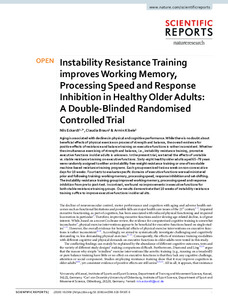| dc.date.accessioned | 2020-03-16T14:41:28Z | |
| dc.date.available | 2020-03-16T14:41:28Z | |
| dc.date.issued | 2020-02-13 | |
| dc.identifier | doi:10.17170/kobra-202003161075 | |
| dc.identifier.uri | http://hdl.handle.net/123456789/11485 | |
| dc.description.sponsorship | Gefördert durch den Publikationsfonds der Universität Kassel | |
| dc.language.iso | eng | eng |
| dc.rights | Namensnennung - Weitergabe unter gleichen Bedingungen 4.0 International | * |
| dc.rights.uri | http://creativecommons.org/licenses/by-sa/4.0/ | * |
| dc.subject.ddc | 796 | |
| dc.title | Instability Resistance Training improves Working Memory, Processing Speed and Response Inhibition in Healthy Older Adults: A Double-Blinded Randomised Controlled Trial | eng |
| dc.type | Aufsatz | |
| dcterms.abstract | Aging is associated with declines in physical and cognitive performance. While there is no doubt about beneficial effects of physical exercise on proxies of strength and balance, the overall evidence for positive effects of resistance and balance training on executive functions is rather inconsistent. Whether the simultaneous exercising of strength and balance, i.e., instability resistance training, promotes executive functions in older adults is unknown. In the present trial, we tested the effects of unstable vs. stable resistance training on executive functions. Sixty-eight healthy older adults aged 65–79 years were randomly assigned to either an instability free-weight resistance training or one of two stable machine-based resistance training programs. Each group exercised twice a week on non-consecutive days for 10 weeks. Four tests to evaluate specific domains of executive functions were administered prior and following training: working memory, processing speed, response inhibition and set-shifting. The instability resistance training group improved working memory, processing speed and response inhibition from pre to post-test. In contrast, we found no improvements in executive functions for both stable resistance training groups. Our results demonstrate that 10 weeks of instability resistance training suffice to improve executive functions in older adults. | eng |
| dcterms.accessRights | open access | |
| dcterms.creator | Eckardt, Nils | |
| dcterms.creator | Braun, Claudia | |
| dcterms.creator | Kibele, Armin | |
| dc.relation.doi | doi:10.1038/s41598-020-59105-0 | |
| dc.type.version | publishedVersion | |
| dcterms.source.identifier | ISSN 2045-2322 | |
| dcterms.source.journal | Scientific Reports | eng |
| dcterms.source.pageinfo | 2506 | |
| dcterms.source.volume | 10 | |
| kup.iskup | false | |


